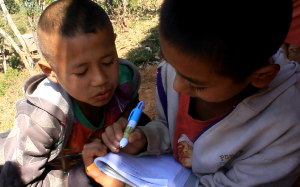 Conflict in Myanmar (Burma) over the past three decades has resulted in a mass movement of populations into Thailand. Nearly 130,000 refugees live in nine camps along the Thailand-Myanmar border, with children making up half the camp population. While the school system in camps is relatively well-established, teaching in refugee schools is a challenging profession: teachers are underpaid, lacking in status, and receive inadequate training and support.
Conflict in Myanmar (Burma) over the past three decades has resulted in a mass movement of populations into Thailand. Nearly 130,000 refugees live in nine camps along the Thailand-Myanmar border, with children making up half the camp population. While the school system in camps is relatively well-established, teaching in refugee schools is a challenging profession: teachers are underpaid, lacking in status, and receive inadequate training and support.
Under the Quality Cross-Border Education Support in Thailand (QUEST) project World Education worked to increase the ability of teachers in refugee camps. Led by Save the Children, in collaboration with the Karen Refugee Education Entity (KRC-EE), Shanti Volunteer Association (SVA), and Mobile Education Partnerships (MEP), the QUEST project aimed to improve the quality of education for displaced children from Myanmar, while building resiliency and reducing risk in refugee communities. The project emphasized improving literacy outcomes and supporting the psychosocial development of children both in school and in refugee communities through reading-based activities.
Within QUEST, World Education provided managerial oversight and technical assistance in its partnership with MEP and KRC-EE to provide subject-based training to over 1000 camp teachers, conduct follow-up visits and development sessions with trained teachers, and improve student literacy and social and emotional learning in the camps. Through the project, World Education also aimed to build the capacity of local education partners, such as the KRC-EE, in order to institutionalize best practices from lessons learned in camp education.
